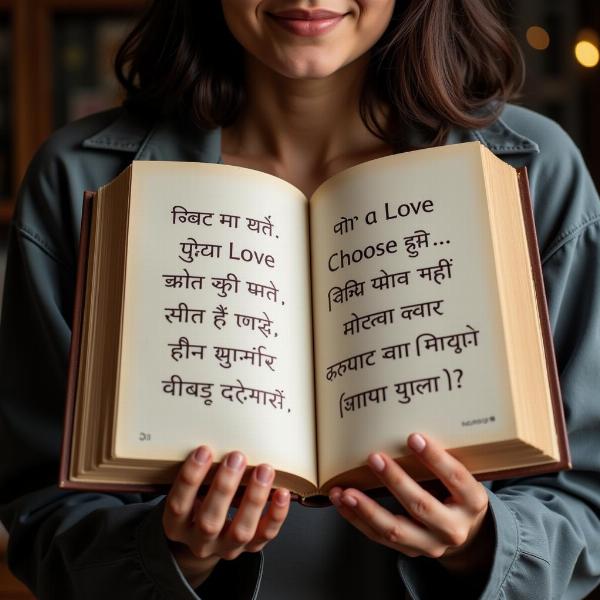Understanding the nuances of romantic expressions across languages can be both challenging and rewarding. The phrase “You are my mine” doesn’t have a direct, grammatically correct equivalent in Hindi. In English, it’s a possessive and emphatic declaration of love, but it sounds a bit unusual. Therefore, translating it requires capturing the intended emotion and meaning rather than a literal word-for-word conversion. This article explores various ways to express the sentiment of “You are my mine” in Hindi, considering cultural context and appropriate phrasing.
Expressing “You Are My Mine” in Hindi
Hindi, a language rich in emotion and poetic expression, offers several ways to convey the deep affection implied by “You are my mine.” While a literal translation might not exist, the essence of belonging and possessiveness (in a loving way) can be captured beautifully.
-
Tum mere ho (तुम मेरे हो): This is the most straightforward and commonly used translation. It translates to “You are mine.” While simple, it effectively conveys a sense of belonging and ownership in a romantic context.
-
Tum sirf mere ho (तुम सिर्फ़ मेरे हो): Adding “sirf” (only) emphasizes exclusivity, translating to “You are only mine.” This adds a layer of possessiveness to the declaration.
-
Mera tumhara rishta anokha hai (मेरा तुम्हारा रिश्ता अनोखा है): This phrase translates to “My relationship with you is unique.” It expresses the special bond and highlights the unique connection between two individuals.
-
Tum meri jaan ho (तुम मेरी जान हो): A more passionate expression, this translates to “You are my life.” It signifies deep love and attachment.
-
Main tumse behad pyaar karta/karti hoon (मैं तुमसे बेहद प्यार करता/करती हूँ): This translates to “I love you immensely.” While not directly translating the possessiveness, it emphasizes the intensity of the love, indirectly implying belonging.
Cultural Nuances and Considerations
When expressing love in Hindi, cultural context plays a significant role. While possessiveness is present in romantic expressions, it’s usually veiled in poetic language and metaphors. Direct and overly possessive language might be perceived as forceful.
-
Respect and Formality: Depending on the relationship dynamic and the level of familiarity, choosing the right level of formality is crucial. Using respectful pronouns like “aap” (आप) instead of “tum” (तुम) might be more appropriate in some situations.
-
Non-verbal Communication: In Indian culture, non-verbal communication, like gestures and eye contact, plays a significant role in expressing affection. A simple touch or a loving gaze can often communicate more than words.
-
Regional Variations: Hindi has various dialects and regional variations. Certain expressions might be more common or carry different connotations in different parts of India.
Choosing the Right Phrase
The best way to express “You are my mine” in Hindi depends on the specific context and the relationship between the individuals involved. Consider the level of intimacy, cultural background, and the overall message you want to convey.
How do you say “You are my everything” in Hindi?
A fitting translation for “You are my everything” would be “Tum mera sab kuch ho” (तुम मेरा सब कुछ हो).
Can I use “Tum meri duniya ho” (तुम मेरी दुनिया हो)?
Yes, “Tum meri duniya ho,” meaning “You are my world,” is another beautiful way to express deep affection.
Conclusion
While “You are my mine” lacks a perfect literal translation in Hindi, the sentiment can be beautifully expressed through various phrases that capture the essence of love, belonging, and exclusivity. By understanding the cultural nuances and choosing the appropriate phrasing, you can effectively communicate the depth of your affection in a way that resonates with Hindi speakers. Remember, conveying genuine emotion transcends literal translations.
 Choosing the Right Hindi Phrase for Expressing Love
Choosing the Right Hindi Phrase for Expressing Love
FAQs
- What is the most common way to say “I love you” in Hindi? “Main tumse pyaar karta/karti hoon” (मैं तुमसे प्यार करता/करती हूँ).
- Is it appropriate to use highly possessive language in romantic expressions in Hindi? While some possessiveness is acceptable, overly forceful language might be perceived negatively.
- Do regional variations affect the interpretation of romantic expressions? Yes, certain phrases might have different connotations in various parts of India.
- How important is non-verbal communication when expressing love in Hindi? Non-verbal communication plays a significant role, often complementing and enhancing verbal expressions.
- What should I consider when choosing a romantic phrase in Hindi? Consider the relationship dynamic, cultural context, and the specific message you want to convey.
Meaning-Hindi.in is your one-stop solution for all your Hindi translation needs. We offer a wide range of professional translation services, from business and legal documents to technical manuals and website localization. Our team of expert linguists ensures accurate and culturally sensitive translations, catering to various industries and academic fields. Need a quick translation or specialized language support? Contact us at [email protected] or call us at +91 11-4502-7584. Meaning-Hindi.in is dedicated to bridging the language gap and facilitating effective communication.